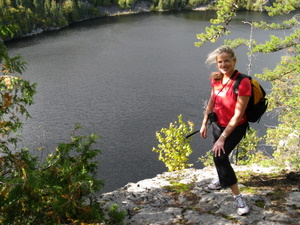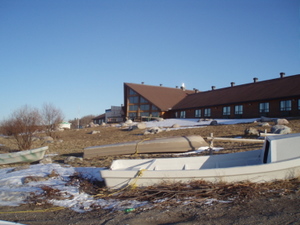
Law grad Stephanie Armengau talks about life as a Crown prosecutor working in the James Bay and Nunavik, bringing the judicial process to cities and towns without courtrooms.
When Stephanie Armengau, BCL/LLB, graduated from the Faculty in 2005, she wasn’t exactly sure about the kind of law she wanted to specialize in but she did know that she wanted to plead and be in court as often as possible.
Armengau articled in a civil law firm for a few months but realized that she wasn’t litigating as much as she wanted to, so in 2009, she became a provincial Crown attorney and became a member of the itinerant court that travels by plane to the Northern regions of Quebec. For a week each month, Armengau and another Crown attorney, along with a judge, court clerks and occasionally detainees, fly to James Bay or Nunavik and hold trials directly among the First Nations communities.
She tells inFocus online about life as a government prosecutor in a remote region of the province.
In your job, you’ve relocated to Amos, a small farming and forestry town of 10,000 inhabitants, 600 km away from Montreal! What has that been like?

I enjoy living in Amos mainly for its beautiful landscapes and outdoor activities. The spring, summer and fall are famous around the province for fishing, hunting, camping and hiking but the winters are very long and cold so you need to take pleasure in doing activities outside such as cross-country skiing or snow shoeing!
There is also no traffic at all in Amos, which is a welcome change from Montreal! However, unlike living in a big city such as Montreal, you do not have many choices when it comes to dining out or catching a movie. In many ways, in order to integrate myself to Amos, I have had to adapt to a simpler way of life and give up my urban style of living.
What is your take on James Bay? What are your perceptions of the social dynamics and cultural makeup?
The first thing that strikes you when you go to a Cree village at the James Bay or to an Inuit village in Nunavik, is that you feel as though you have left Quebec and landed somewhere else on the globe. Indeed, the Crees and the Inuits have a different language and writing system and their second language is often English, rather than French, making communication difficult for many people who visit there. The court being constituted of only non-Cree people (except for the translators), it is also a significant challenge without the translation to establish good communication with the locals especially when interviewing several Crown witnesses.
There are 16,000 Crees based in nine communities and as a Crown Attorney, I have had the chance to travel to each village and to have trials there for one week. Unfortunately, due to the heavy workload and the limited time, I did not get the chance to really absorb myself in the Cree culture. However, I did observe the Cree communities to be warm, very family-oriented and having a great respect for their elders. Also, the Crees maintain a close relationship with nature through their hunting of goose and caribou and fishing of walleye.
What you also realize instantaneously is that most of the Native communities in Quebec are still pained by the government’s mistreatment of their people in the past. This situation is made extra difficult by the fact that it is our job to ensure that the accused be properly sentenced and eventually sent to jail. Still in spite of this, it is my hope that with time a solid bridge of trust will be built that will narrow the misunderstandings between both our cultures.
Many of the crimes you deal with are violent and are related to sexual assault and domestic violence. What’s it like for you, personally and professionally, to handle so many cases of this nature?
At the beginning, I was shocked like any person would be. Assaulting a human being, whether it is sexual or not, is a horrible and revolting situation because of the long term consequences that the victim will bear. The cases I see are typically acts of violence triggered by either alcoholism and/or drug abuse, even if most northern communities are considered alcohol-free.
The saddest thing about these crimes is that most of the women refuse to testify when the time comes to tell the judge about their husbands’ crime. Not only are they afraid of being assaulted again but very often the father is the sole provider of the family’s needs. Having him sent to jail means less economic resources for her children. Also, unlike big cities, the government doesn’t provide these villages with women’s shelters where they could be protected.
Professionally speaking, we feel helpless when we handle such cases because we have no guarantee that the victims will testify the day of the trial. We do the best of our abilities and charge the accused according to the evidence that is provided to us but we mostly have to close our files on the day of the trial because we have no more evidence to offer and the accused is acquitted…only to be charged again with the same crime several weeks later.
After a couple of months, you start to develop some kind of immunity and you learn to detach yourself emotionally from such violence. As a good Crown attorney, it is absolutely paramount to safeguard yourself in order to maintain your neutrality and objectivity.
Can you provide some numbers that might give an idea of how many cases you are dealing with when you talk about the “high volume”? How do you allocate your time?

The best idea I can give is this: when we leave for the North, we only are two Crown attorneys and take between 12 and 16 large lawyer briefcases of files. These files go from simple appearances in court to preliminary enquiries or trials. This is an enormous number of files compared to Montreal and in order to allocate our time, we are obliged to quickly prioritize the important files – including sexual assaults against minors, old files that have been delayed for years, or files where the witnesses came from far away to testify – from the less important ones.
These high volumes are detrimental to the process because they limit the time available to meet with the victims of domestic violence and to prepare them for trial, which truly bothers me because this usually results in the victims not wanting to testify in front of the judge and obliges us to drop the charges entirely.
Consequently, it is necessary to maintain good relationships with the defense attorneys because plea bargain negotiation is one of the best ways to find a reprieve from the volume. Working in the North is very stressful and an important responsibility. You have to be fast and able to quickly adapt to any new challenges that appear.
